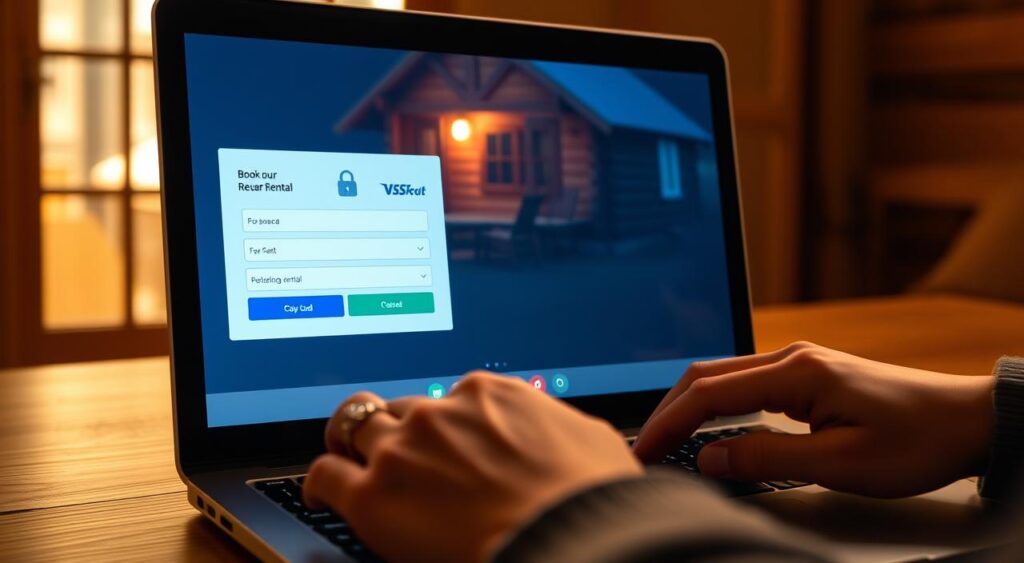Booking a vacation rental online has become very popular. They offer great flexibility and can even save you money. But, there’s a downside. With more bookings online, the chance of running into fraud has gone up. Learning how to spot these scams is key to keeping your money safe. From listings that don’t exist to hackers taking over accounts, it’s critical to know what to look out for. Knowing about these scams helps protect you from losing money and facing disappointment.
Key Takeaways
- Understanding the risks associated with online vacation rental bookings.
- Recognizing common types of vacation rental scams.
- Identifying red flags to protect your funds.
- Taking steps to avoid financial losses from scams.
- Utilizing secure booking methods for greater peace of mind.
Understanding Vacation Rental Scams
Planning your perfect getaway? You might want to search online for options. Knowing how to steer clear of vacation rental scams is key. Learning the tricks scammers use can save you a lot of stress and money. Exercising due diligence by thoroughly investigating listings, hosts, and payment methods is crucial to safeguarding your vacation experience.
What Are the Common Types of Scams?
There are many scams in the vacation rental world, often perpetrated by scammers. Some involve fake listings of non-existent properties. Scammers often steal pictures and details from legitimate listings to make their fraudulent advertisements appear credible. Others are about taking over real accounts to trick people. There are also bait-and-switch scams, and double booking scams where a property owner makes multiple bookings for the same rental property on overlapping dates. Scammers also create fake listings using stolen images and property details to mislead potential renters. Knowing these scams, including completely fake vacation home listings, helps you dodge fake listings and ensures a safer stay.
Red Flags to Look Out For
Stay alert for warning signs of a scam. Be cautious of deals that seem too cheap to be true. It’s a common trick. Also watch out if a property owner prefers payments off the booking platform, like wire transfers. Spotting these red flags and following tips for safe vacation rentals can greatly lower scam risks, especially since double booking scams happen frequently .
How Scammers Operate Online
Scammers have their ways to deceive potential renters. They might list fake properties on well-known websites, using attractive photos. Often, these listings include the scammer’s contact information to lure victims into providing a security deposit or down payment. Some even hack into real rental accounts to appear credible. Scammers manipulate listings and collect payments from unsuspecting guests, often changing property details to deceive guests into booking properties not controlled by the rightful owners. Sometimes, they manipulate online search results to pull people to their fake sites. Being aware of these methods helps you identify legitimate rental listings, which is crucial for a secure booking.
| Type of Scam | Key Characteristics |
| Fake Listings | Advertisements for properties that do not exist |
| Account Takeovers | Scammers hijacking legitimate rental accounts to scam renters |
| Bait-and-Switch | Offering one property and substituting it with another |
| Double Booking | Renting the same property to multiple parties |
Importance of Vacation Rental Scam Protection
It’s not just about keeping your money safe. It’s also about making sure your trip is enjoyable and worry-free. Taking steps to ensure the use of a secure payment portal that can offer protection against vacation rental scams is vital. It helps keep scammers away from you.
Why Protecting Your Funds is Crucial
When you book a rental online, keeping your money safe is very important. Scammers create fake listings that look real to trick travelers. They often request a down payment on these fake rental listings, and once the victim pays this down payment, they risk losing their money and may face further complications such as canceled reservations or non-existent properties. By being careful, you make sure your money goes to a real rental. This makes your stay safe and fun. Vacation rental scam protection starts with doing your homework and choosing safe ways to pay.

The Financial Impact of Falling for Scams
Falling for a scam does more than just lose you money right away. People tricked by these scams often end up paying more for last-minute places to stay. They might lose a lot of their travel money. Scammers ruin vacation experiences by causing financial loss and stress. The stress and worry about fixing these problems, especially after receiving multiple negative reviews, can ruin your trip, too.
| Aspect | Description |
| Immediate Financial Loss | Losses encompass money sent to fraudulent accounts, leaving no accommodation upon arrival. |
| Unexpected Expenses | Additional costs for booking new accommodations last-minute, often at higher rates. |
| Emotional Distress | Stress and anxiety from the inconvenience and financial strain caused by the scam. |
| Long-term Impact | Potential damage to credit and long-lasting financial repercussions. |
Focusing on preventing vacation rental fraud helps you save your investment and enjoy your vacation more. Being aware and careful is essential for a secure and fun trip during your next vacation rental .
Tips for Vetting Vacation Rentals
Your safety and money safety are top priorities when booking a vacation rental. Use smart strategies, such as booking through reputable websites, to avoid fraud. When dealing with a private landlord, it’s crucial to verify property ownership by using county tax assessment websites. This ensures your stay is as good as you hope.
Checking Reviews and Ratings
Looking at feedback from past guests is key. Trustworthy sites like Airbnb and Vrbo often display the full rental price alongside real reviews. Choose places with lots of good reviews that tell about the stay’s quality. Be cautious, as some victims have arrived at a property only to find it is already booked by someone else or never existed at all.
Using Reputable Rental Platforms
Book through safe sites such as Airbnb, Vrbo, or Booking.com. They check their listings, including the property owner’s name, and have policies to protect you. Having access to their customer support can be very helpful if problems come up. Additionally, it is crucial to maintain thorough documentation of all interactions and property conditions, including keeping records of communication and photographic evidence, when dealing with a rental company.
Contacting Owners or Managers Directly
Talk to the owner or manager before paying. This can help you feel sure about their trustworthiness. Asking questions about the property and area can also help uncover any scammer’s contact information. Be cautious if they avoid answering clearly.
| Verification Method | Benefits |
| Reviews and Ratings | Gains genuine insights and avoids fraudulent listings. |
| Using Reputable Platforms | Ensures secure transactions and access to customer support. |
| Direct Contact with Owners | Helps validate the legitimacy of the listing and owner. |
Best Practices for Secure Transactions
When booking vacation rentals, keeping your money safe is key. Choose reliable payment methods for your next vacation rental. Avoid wire transfers and think well about paying in person. Documenting details can strengthen your position during disputes with a credit card company. These steps can help protect you online.
Trusted Payment Methods
For safer booking, always use trusted payment methods. Sites like Airbnb, Vrbo, and Booking.com have secure systems. They keep your payment safe and help if there’s a problem. These methods enhance your security online.

Avoiding Wire Transfers
Wire transfers can lead to trouble because they’re hard to track. Scammers love them for this reason. Use platforms that offer security and trusted ways to pay instead. This lowers the chance of losing your money to scams.
In-Person Payments: Pros and Cons
In-person payments may seem good, especially nearby. But they come with risks, like less security if issues arise. Platforms with online security that require a security deposit offer stronger protection, making sure your transaction is safe.
| Payment Method | Pros | Cons |
| Credit Card | Dispute mechanism, fraud protection | Possible fees |
| PayPal | Secure transactions, buyer protection | May incur fees |
| Wire Transfer | Immediate transfer of funds | Difficult to trace and recover funds if fraud occurs |
| Cash | Immediate confirmation, no fees | No buyer protection, risk of loss or theft |
Recognizing Genuine Rental Listings
Looking for a vacation rental? It’s important to find real listings. You can trust homes on websites that check host information and display multiple listings. Be cautious, as scammers often create their own listing using stolen images or details from legitimate properties. They also show clear and complete pictures.
Signs of Reliable Listings
Good listings have quality photos that look the same. They should also describe the place accurately. This includes details about what’s inside and where it is, ensuring that the property exists. Verifying the authenticity of property details is crucial to avoid falling victim to rental scams. Lots of good reviews from past guests are a good sign too.
The Role of Verified Hosts and Listings
Platforms like Airbnb check their hosts’ backgrounds. This helps you avoid fake listings. Using a popular vacation rental website for checking hosts means you’re more likely to find a real place to stay. It makes your vacation rental search safer. Additionally, reputable platforms ensure that potential guests are screened and verified, which enhances trust and safety in the rental process.
| Feature | Genuine Listing | Suspicious Listing |
| Verification | Verified Hosts | Unverified Hosts |
| Images | High-quality, consistent | Low-quality, mismatched |
| Reviews | Frequent, detailed | Few or generic |
Utilizing Technology for Safety
Using technology is key to keeping transactions and interactions safe in the vacation rental industry. By using advanced tools, we can make online security better. This gives everyone peace of mind.
Apps for Secure Payments
Using apps for secure payments is a smart way to keep your money safe. These apps protect your banking and personal info with end-to-end encryption. Services like PayPal, Venmo, and Zelle are known for their strong online security. Additionally, when planning your next getaway, it’s important to be cautious when booking a vacation rental through popular platforms like AirBnB and VRBO to avoid potential cybercriminals.
Features of Reputable Rental Websites
Trustworthy vacation rental sites have many security features to safeguard users.
Important features include:
- Verified user reviews
- Secure payment gateways
- Fraud detection systems
- SSL certification
Sites like Airbnb and Vrbo set a high standard for online security in vacation rentals. They ensure a safe browsing and booking process. For more tips that enhance safety and security for consumers, you can refer to additional resources such as their Security Center.
How to Use Location Services Wisely
Location services can help verify the location of your rental. But, it’s important to use them smartly.
- Only enable location tracking on trusted apps.
- Compare map data with the information the host gives.
- Turn off location services once you’ve checked the rental.
- Use local government resources to search city or county tax assessment websites for accurate ownership information.
Being careful with location features boosts your online security. It leads to a safer, better vacation.
The Role of Customer Support
Effective customer support is key to helping users during their vacation rental journey. It deals with booking issues, resolves conflicts, and provides quick help. Verifying the legitimacy of property owners is crucial to avoid scams where fraudsters impersonate the real owner. This kind of support is essential to ensure a smooth experience.
Importance of 24/7 Support Lines
Trusted vacation rental sites offer 24/7 support. This service means help is always available, day or night. If there’s a scam or a dispute, it can be quickly handled. Double booking scams, where multiple guests are booked for the same property, can cause significant issues, leaving the last guest without accommodations.
Renters feel secure knowing they have constant access to support. It’s a crucial service that offers immediate peace of mind, especially in cases where fraudulent rents occur, ensuring that issues are resolved promptly.
What to Expect from Rental Platforms
Trusted vacation rental sites provide many customer service options.
Expect to find:
- Live chat support for quick answers
- FAQs for common questions
- Direct email links to support teams
These features make the rental process easier and more transparent. They help build trust between users and the platform. However, be aware of double booking scams where property owners may book multiple guests for the same property during overlapping dates, leading to confusion and distress for the last guest to arrive, who finds the property already occupied.
Having a strong customer support system is essential when renting. Choosing platforms with good support makes renting better and safer. It ensures a worry-free holiday by protecting your money.
Reporting Suspicious Activity
If you think a listing is fake, act fast to stop it. Reporting can prevent you and others from being tricked. Know how to spot and report scams. This knowledge is key.

How to Report Scams
Start by collecting all info, like listing details and messages. Having everything clear makes it easier to explain what happened. Make sure to gather the scammer’s contact information, as this is crucial when reporting the scam. Rental sites often have special sections for reporting scams, or you can ask their customer service.
Where to Report Fraudulent Listings
After telling the rental site, talk to both federal and local authorities. The Federal Trade Commission (FTC) and your local police are good places to start. Don’t forget the Internet Crime Complaint Center (IC3) for online fraud.
Your detailed reports help catch scammers fast. By staying alert, you protect your money and help others.
Understanding Rental Policies
Looking at vacation rentals? Knowing the rental policy well is key. It helps you avoid being tricked and makes sure you know what to expect. This way, there are no bad surprises waiting to mess up your trip. Additionally, take screenshots of the rental listing for documentation purposes. This ensures you have a record of the property’s details before and after your stay, which can serve as evidence in potential disputes with landlords or rental companies.
Reading the Fine Print
Small details in a rental agreement are important. Reading the fine print means you know the rules well. It helps prevent arguments and saves you from extra costs you didn’t see coming. Additionally, understanding the fine print can protect you from account takeover scams where fraudsters impersonate the actual owner of the property, putting you at risk of paying scammers who misrepresent themselves.
Cancellation and Refund Policies Explained
Cancellation and refund policies are vital to understand. Knowing these policies helps you stay clear of vacation rental scams. Being aware of what conditions allow for refunds keeps you from losing money if plans change.
Educating Yourself on Local Laws
Knowing local laws well is key to avoiding vacation rental scams. Laws vary a lot from one state to another. This affects your rights as a consumer. It’s important to learn about these differences. This way, you protect your money and have a great vacation.
When dealing with a private landlord, it’s crucial to verify property ownership. Use local tax assessment websites to confirm the landlord’s legitimacy and ensure the property is not misrepresented.

Differences in State Laws About Rentals
Each U.S. state has its own rules about vacation rentals. These rules can change how long you can stay, what kinds of vacation homes you can rent, and what both renters and homeowners must do. For example, some states have tough rules on short rentals while others are more easy-going. Additionally, using county tax assessment websites to verify property ownership is crucial, especially when dealing with private landlords, to ensure the legitimacy of property listings by cross-referencing information from official governmental sources.
| State | Key Regulation | Impact on Short-Term Rentals |
| California | 30-Day Minimum Stay in Certain Cities | Limits on short-term rentals to protect housing stock. |
| New York | Prohibition on Rentals Less Than 30 Days Without Host | Mitigates crowded accommodations in residential areas. |
| Florida | No Statewide Rental Duration Limits | Promotes flexibility for short-term vacation rentals. |
Understanding Your Rights as a Consumer
Your rights in vacation rentals are protected by different laws in each state. Knowing these rights helps you stand up against unfair treatment. If a deal goes wrong, you can fight back. Having a detailed rental agreement helps too. It should include things like how to cancel and get refunds. This protects you from scams.
Learning about the laws for vacation rentals makes you ready to avoid scams. You’re also more likely to have a smooth rental experience.
When to Seek Legal Assistance
Finding out you’re in a vacation rental scam can be scary. But knowing when to get legal help can really change things for the better. It’s key to know your options and when it’s time to take legal steps. Documenting details can strengthen your position during disputes with a credit card company, as their decisions play a crucial role in the resolution process.
Knowing Your Options
When you face vacation rental fraud, start by exploring all the help you can get. Most rental platforms offer support. But sometimes, the problem is too big, and you need legal advice. Talking to an attorney can clear things up, whether about paperwork, getting your money back, or other legal steps. Be aware of account takeover scams where fraudsters manipulate real rental accounts to change property details, deceiving guests into booking properties not controlled by the rightful owners.
When Legal Action is Necessary
There are times when you must take legal action. This is especially true for big financial losses or complex scams. If talking it out or mediation doesn’t work, legal help can make sure the right steps are taken. A legal expert can help with lawsuits or claims, making dealing with rental fraud easier.
Getting legal advice quickly also helps protect your rights and could stop others from being scammed. Always keep detailed records of all your dealings, as these are important for any legal action.
Key Points:
- Evaluate all support options before legal action.
- Consult an attorney to understand your legal rights and remedies.
- Document all evidence thoroughly for potential legal proceedings.
Conclusion: Staying Safe While Traveling
Being careful when you book vacation spots is key to having a fun and safe trip. Pay attention, make smart choices, and know how to stay safe. This way, you can avoid scams that trick travelers.
Recap of Key Protective Measures
Keep your trips scam-free by checking rental reviews and ratings carefully. Only use trusted websites and talk directly with the property owners. Use safe ways to pay, and stay away from wire transfers that could lead you to a random company instead of a trusted service . Know the rental’s rules, especially about cancelling and getting your money back. Also, learn about local laws that protect you as a renter.
Encouragement to Be Vigilant and Smart
As you explore vacation rentals, staying sharp and wise is your best shield against scams. Lean on technology, good rental sites, and customer support for help making choices. Stay aware and informed to enjoy your vacations without worrying about scams. Follow key safety tips for vacation rentals to protect your money and peace of mind.
FAQ
What are the common types of vacation rental scams?
Watch out for fake listings, account takeovers, bait-and-switch tricks, and double bookings. These scams trick travelers into paying for places that don’t really exist or aren’t as promised.
What red flags should I look out for to avoid vacation rental scams?
Stay away from offers that seem too good to be true. Be cautious of demands for payments off the main platform, bad photos, and listings without verified host details. These are scam signs.
How do scammers operate online when it comes to vacation rentals?
Scammers lure you with fake but appealing listings. They may also hack accounts to seem legit or double book to cheat several people. Knowing these tricks can keep you safe.
Why is protecting your funds important when booking vacation rentals?
Keeping your money safe prevents big financial losses, ensuring your travel plans don’t fall apart. Losing money to scams is upsetting. It ruins your holiday mood.
How does falling for vacation rental scams financially impact victims?
Falling for a scam means losing money right away, facing recovery costs, and dealing with stress. It can mess up your vacation and involves a tough process to try getting your money back.
How can I vet vacation rentals effectively?
Look at reviews and ratings. Stick to well-known platforms like Airbnb or Vrbo. Talk to the owners or managers directly. This helps you know if the rental is real and good.
What are the best practices for secure transactions when booking vacation rentals?
Always use secure payment options the rental site gives you. Stay away from wire transfers and be cautious with payments made in person. This keeps your money safe.
What are the signs of reliable vacation rental listings?
Real listings usually have info on the host that’s been checked, detailed write-ups, clear photos, and good reviews. Sites like Airbnb check host details to make sure listings are reliable.
How can technology help ensure safe vacation rental transactions?
Make sure to use safe payment apps and GPS for extra security. Secure payments and confirming your location in real-time add safety to your transactions.
Why is effective customer support essential during the vacation rental process?
Good customer service gives you peace of mind and help right away if there’s trouble. Services that are there for you 24/7 can solve problems and offer answers fast.
How do you report suspicious activity related to vacation rentals?
Tell the rental platform, the Federal Trade Commission (FTC), and local police about any scams. Reporting quickly can stop future scams and protect other people.
Why is it important to understand the fine print in rental policies?
Knowing the cancel and refund rules can keep you out of legal and financial problems. It’s key for solving issues you might have while renting.
How do state laws impact vacation rental bookings and consumer rights?
Laws about vacation rentals differ from state to state. This affects your rights as a renter. Knowing these laws helps you deal with problems or scams the right way.
When should you seek legal assistance for vacation rental scams?
If you’re scammed, get legal help to know your options and fight for justice. Legal advice is important for getting back what you lost and settling the scam issue.






